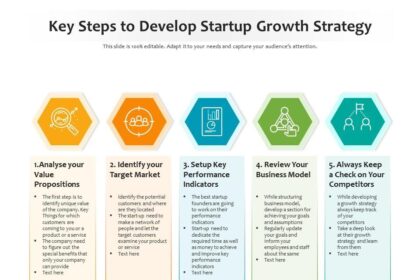In the ever-shifting landscape of entrepreneurship, where brilliant ideas often emerge from the shadows of obscurity, startup incubators and accelerators have become the beacons guiding fledgling ventures toward success. These dynamic ecosystems serve as fertile grounds for innovation, nurturing raw talent and transformative concepts through structured support, mentorship, and resources. As the heartbeat of the startup world, these programs not only offer a lifeline to aspiring entrepreneurs, but they also contribute significantly to the broader economy by fostering creativity and technological advancement. In this article, we will explore the vital role that incubators and accelerators play in fueling innovation, examining their unique approaches, success stories, and the impact they have on the entrepreneurial landscape. Join us as we delve into the mechanisms that turn ingenious ideas into thriving businesses and understand why these platforms are essential to the future of innovation.
Fostering a Culture of Entrepreneurship Through Incubator Programs
Incubator programs serve as a fertile ground where entrepreneurial dreams can take root and flourish. By providing comprehensive support, these programs enable emerging startups to transform their innovative ideas into viable businesses. Entrepreneurs are immersed in a thriving ecosystem that encourages collaboration and knowledge sharing. Key components contributing to this entrepreneurial culture include:
- Mentorship: Access to seasoned professionals who guide startups through critical decision-making processes.
- Networking Opportunities: Regular events that connect entrepreneurs with investors, industry leaders, and like-minded peers.
- Business Resources: Provision of essential tools such as office space, legal guidance, and funding advice to help streamline operations.
Moreover, incubators foster a sense of community that reduces the inherent risks associated with startups. They create an environment where entrepreneurs can freely share their experiences and challenges, thus encouraging collective problem-solving. The role of feedback loops is invaluable, as they help startups iterate on their products more efficiently. A quick glance at the benefits illustrates why such programs are vital:
| Benefits of Incubator Programs | Description |
|---|---|
| Reduced Costs | Shared resources help save on operational expenses. |
| Access to Funding | Connection with investors seeking emerging talent. |
| Skill Development | Workshops that enhance entrepreneurial skills and knowledge. |

Navigating the Startup Landscape: Differentiating Incubators from Accelerators
When exploring the vibrant ecosystem of startups, it’s essential to understand the distinct yet complementary roles that incubators and accelerators play. Incubators typically focus on nurturing early-stage ideas and providing a supportive environment for entrepreneurs to develop their concepts into viable businesses. They often offer resources such as mentorship, office space, and access to networks over a longer period, allowing startups to evolve at their own pace. Key features of incubators include:
- Long-term support: Programs can last from several months to years.
- Flexible entrance criteria: Open to ideas at various stages of development.
- Focus on ideation: Emphasis on refining products or services.
On the other hand, accelerators are designed to fast-track the growth of established startups through intensive, short-term programs that often culminate in a demo day or pitch event. They provide a structured curriculum, investment opportunities, and valuable connections within a compressed timeline. This rapid acceleration aims to equip entrepreneurs with the tools and knowledge necessary to scale their businesses quickly. Notable characteristics of accelerators include:
- Time-sensitive programs: Typically span three to six months.
- Selective admission: Rigorous application process to identify high-potential startups.
- Investment opportunities: Often include funding in exchange for equity.

Building Bridges: The Importance of Networking and Mentorship
In the fast-paced world of startups, forging relationships can transform ideas into impactful ventures. Networking serves as a gateway to opportunities, connecting founders with investors, collaborators, and industry leaders. Engaging in local startup events, online forums, or mentorship programs can yield invaluable insights and create pathways to success. Mentorship, in particular, plays a pivotal role, providing guidance based on real-world experience that can help navigate the myriad challenges associated with launching and scaling a business. When founders actively seek out mentors, they empower themselves with strategies that might otherwise take years of trial and error to discover.
Moreover, the collaborative atmosphere fostered by incubators and accelerators enhances these relationships. Participants are often immersed in communities of like-minded entrepreneurs, where knowledge sharing is encouraged. This environment not only nurtures personal growth but also sparks innovation through diverse perspectives. Key components that underscore the significance of these programs include:
- Resource Access: Participants gain access to tools, funding, and infrastructure.
- Skill Development: Workshops and training improve essential business skills.
- Peer Support: A close-knit community fosters encouragement and accountability.

Measuring Success: Key Metrics for Evaluating the Impact of Incubators and Accelerators
When assessing the influence of startup incubators and accelerators, it’s essential to focus on a variety of metrics that reflect both short-term and long-term success. Key performance indicators such as funding secured, number of startups launched, and the growth rate of participating companies offer a glimpse into the immediate effectiveness of these programs. Additionally, metrics like mentor engagement, network expansion, and community impact can help illustrate how well these initiatives foster an environment conducive to innovation. Tracking the survival rate of startups post-program is also crucial, as it indicates the sustainability of the support provided.
Furthermore, the qualitative aspects of success should not be overlooked. Gathering feedback from startups on their experiences can yield insights into the effectiveness of mentorship and resources provided. This can be evaluated using methods such as surveys or interviews. Below is a sample table highlighting some of the essential metrics for evaluating incubators and accelerators:
| Metric | Definition | Importance |
|---|---|---|
| Funding Secured | Total capital raised by startups | Indicates market confidence |
| Startups Launched | Count of new ventures created | Reflects program activity |
| Growth Rate | Percentage increase in revenue | Measures economic impact |
| Mentor Engagement | Frequency of mentor interactions | Quality of support provided |
The Conclusion
As we draw the curtain on our exploration of startup incubators and accelerators, it becomes evident that these dynamic environments are not merely about nurturing fledgling ideas; they are the lifeblood of innovation in our rapidly evolving world. By providing the resources, mentorship, and networks that young entrepreneurs need, these programs empower the next generation of visionaries to challenge the status quo and drive meaningful change.
In a landscape where agility and creativity are paramount, incubators and accelerators stand as beacons of hope and possibility. They cultivate ecosystems where ideas can blossom into viable solutions, ready to tackle the world’s most pressing challenges. As we look to the future, the role of these institutions will only grow more critical, shaping the trajectory of industries and, ultimately, the way we live and work.
So, whether you’re an aspiring entrepreneur, an investor, or simply a curious observer of the startup landscape, remember that innovation thrives where collaboration and support are in abundance. The journey may be complex, but with the right guidance, the simplest of ideas can ignite extraordinary revolutions. The future awaits—let’s continue to fuel the flames of creativity and watch as new ventures rise to inspire us all.



